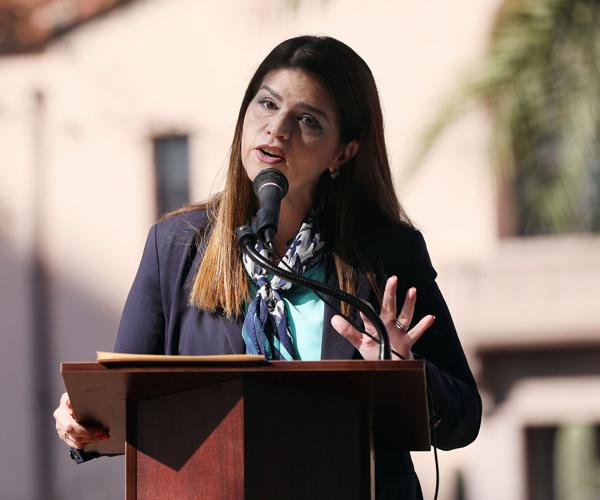Employees of Pima County and the city of Tucson are now protected under federal mental health parity laws, after recent decisions by local officials to opt in to such protections.
The Mental Health Parity and Addiction Equity Act was signed into law in 2008 and requires insurance coverage for mental health conditions and substance use disorders to be no more restrictive than insurance coverage for medical conditions.
Opting into parity protections means employees and their families are protected under laws previously unavailable to them. Employees enrolled in the city's or county's health plans can now challenge denials of mental health or substance use services they believe should be covered.
Pima County and Tucson are the first jurisdictions in the state to voluntarily discontinue opting out of parity requirements.
As of May, there were 4,921 employees covered under the county's health plan. Including family members, the total number of people covered was 10,201, according to data provided by the county.
In April, the city recorded 10,453 people enrolled in its health insurance. Active employees accounted for 3,562 people enrolled, dependents for 6,034 and there were 857 retired employees covered under the health plan, according to city data.
The change came about after efforts by Mental Health America of Arizona and Children's Action Alliance, with support from other local mental health advocates and the Kennedy Forum, an organization that aims to transform the health care system by uniting stakeholders around a common set of principles, including full implementation of the federal parity law.
The advocates say they hope the 13 other Arizona jurisdictions that continue to opt out will follow suit.
Two years ago, Gov. Doug Ducey signed Arizona's mental health parity bill, Jake's Law, which was named after 15-year-old Jacob Edward Machovsky, who died by suicide in 2016. Jake's Law doesn't apply to self-funded non-federal government plans, which is why advocates are urging remaining jurisdictions to opt in.
“The federal parity law is, at its core, a landmark antidiscrimination law,” David Lloyd, senior policy advisor at The Kennedy Forum, said in a news release announcing the city's and county's decisions to opt in. “Having parity rights secured for city and county employees and their covered family members is a huge victory.”
Advocates say access to care, including for those with insurance, remains a major barrier in Arizona, which ranks 49th overall and 49th for youth mental illness, according to the 2022 State of Mental Health in America report. This means there's a high prevalence of mental illness and the lowest access to care.
Research shows that Arizonans are 10 times more likely to go out-of-network for inpatient behavioral health facilities than for medical or surgical facilities, and nearly seven times more likely to go out-of-network for outpatient behavioral health facilities, which ends up costing more money out of pocket.
While problems still exist with the system, mental health advocates say the decisions by the city and county are big steps forward.
"We applaud that leadership," Michelle Crow, Southern Arizona director of the Children Action's Alliance, told the Star. "It's huge when you're the first on the dance floor to do it, and to recognize particularly now during the pandemic and the results and statistics that are demonstrating that folks are really struggling."
Crow said she and others worked closely with Pima County Supervisor Adelita Grijalva, who recently expressed concern to new County Administrator Jan Lesher about the previous decision to opt out.
"I didn't understand why we'd opted out," Grijalva said. "When I started asking questions about it, the county administrator asked the same and what was the reason."
Grijalva said she didn't know if it was the change in leadership in the county that spurred the change, but she said when everyone came to the table — including the county's finance and benefits departments — no one could find a reason why Pima County shouldn't be providing mental health parity.
"We're aware of the impacts of COVID and isolation. Now we realize how critical it is, and it's just as important to have access to mental health as dental and vision and other medical services," Grijalva said. "And my having been on the Tucson Unified School District board, I saw all the other programs we put into place over there because we know the impact COVID had on kids and staff. So it made a lot of sense to adopt a policy at the county that provided mental health parity."
Tucson Mayor Regina Romero and City Manager Mike Ortega also worked closely with advocates to move the change along, according to Crow.
"I have nothing but respect and good words to say about the coalition of organizations that got together to bring this to my attention. These organizations are doing incredible work for our residents," Romero said. "It took me a couple of months to make sure it was brought to the attention of the council and city manager, but it worked out perfectly because we were in the midst of budgeting."
Romero said she was previously unaware that the city was opting out, but she's happy to have the opportunity to correct that decision.
"It's so timely because we hear mental health concerns from so many, and we're seeing mental health issues paired with violence. That is very, very concerning for me," she said.
"Every family is affected by mental and behavioral health issues. I deeply believe that this investment has to be done by the city of Tucson to make sure we have a workforce that not only themselves are healthy in terms of their mental health, but also their children and their partners."
Crow said the Kennedy Forum has launched a nationwide campaign. With 35,000 non-federally funded health plans and 0.5% of those plans still opting out, groups like Mental Health America and the Kennedy Forum are working to chip away at the list, she said.
"It's one of the few remaining unknown loopholes in federal law that some remaining health plans get to opt out of parity laws," she said. "It's important to think about what are the barriers that are in place, what are the impediments and what are some of the inadvertent ways that we stigmatize mental health."
While federal regulations still allow the plans to opt out, when they do, their name is sent to the Center for Medicare and Medicaid Services, which publishes a list on its website of the jurisdictions that continue to opt out.
"This helps stigmatize (mental health treatment) and sends the wrong message to your employees that this is too expensive or not worth covering," Crow said. "That's an important way to send kind of a crummy message to your employees about their benefits."
Crow said everyone knows someone who is struggling with mental health or substance use issues right now.
"If it was up to me, and I was a major employer, I'd be sending out notices to all employees that their health plans allow access to mental health and substance abuse services," she said.







